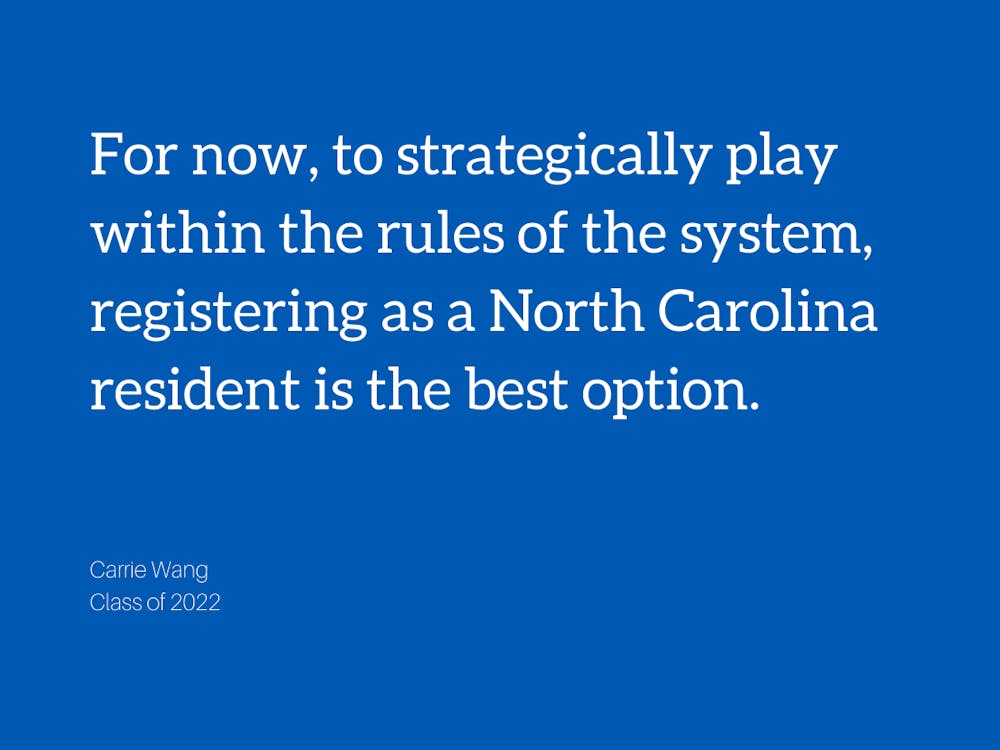If you’ve walked past WU at all in the past couple of days, you’ve probably noticed the picket signs emblazoned with candidates’ names, or the brightly-colored banners encouraging you to cast an early vote. Officially, North Carolina votes on Super Tuesday, along with thirteen other states. Due to the influence that states with earlier primaries and caucuses have on public opinion and polling across the country, this day has the potential to become a turning point for the rest of the election cycle.
These days, the names of the frontrunning Democratic presidential candidates have permeated most political conversations (although we might be hearing less about Pete Buttigieg as of Sunday), and the polls seem to constantly forecast a different winner. Right now, Sanders and Biden are virtually tied for first in North Carolina’s polls, with Biden overtaking Sanders very recently and winning by one percentage point. By far, this is the narrowest gap between the first and second top-polling candidates out of the Super Tuesday states. Thus, it is clear that in North Carolina, voter turnout is especially important in determining who secures a nomination or wins an election, more so than in other states.
Although it is now too late to switch your voter registration to North Carolina for the primary, there are still myriad reasons to switch your voter registration to North Carolina by the general. For one, at Duke it is a very easy, streamlined process; when I voted this past weekend, it took me five minutes to change it to North Carolina from Georgia, and all I needed to give as proof of residency were the last four digits of my Social Security number, my Duke PO Box number and my Duke card as ID. Aside from that, there will be other primaries and local elections in the upcoming year, and absentee ballots often get lost in the mail or delivered late. Perhaps the largest reason for changing your voter registration to North Carolina is the fact that historically, North Carolina has been just as divided between party lines as it is currently in regards to the Democratic presidential candidates. As a swing state, every vote here may determine whether Trump or the eventual Democratic candidate takes our fifteen electoral votes in November.
Unfortunately, Trump won North Carolina in the 2016 presidential election. Republicans also won the state with Romney’s victory in 2012. Despite the Republican sway that this may portray, Obama defeated McCain in North Carolina as recently as 2008, and in most recent gubernatorial elections this century (all except in 2012), the Democratic candidate has won. Furthermore, as of November 2019, 36.76% of our state’s registered voters were Democrats, whereas only 29.99% were Republicans. What with these statistics, further bolstered by the fact that Trump and Romney both won only by a few percentage points each, there is clear potential for North Carolina to flip either the Senate seat or the electoral college come November.
When it comes to electing a president, one concern that often shifts the voting process away from pure ideology is the overarching concern of Donald Trump. On the debate stage, the Democratic candidates have persistently sparred over who has the capacity to win a general election. Although this may legitimately be a concern for the current presidential election cycle, this is not exactly the case for Durham from a local standpoint. Although situated in a very divided state, Durham itself consistently votes blue. Thus, when it comes to local elections, Durham voters are situated to promote progress and novel political energy through drawing attention to progressive Democrats, rather than only prioritizing whoever is more likely to defeat a Republican, and in order to usher in progressive policies on a national scale, we need to do so locally—something that Durham is positioned for. Furthermore, as we saw in the 2016 presidential election, we need to choose progressive candidates aligned with the people in order to energize voters for a maximized turnout, and the Durham area is the perfect place to enact such change.
Initially, I was rather hesitant about changing my voter registration to North Carolina from Georgia. Right now, Georgia is not as deeply red as it has been historically, and furthermore, the district that I live in is virtually equally conservative and liberal; our House of Representatives seat flipped to blue in the most recent election. Despite this, North Carolina as an entire state still has more potential to flip in November than Georgia does, and by moving my registration, I can support a progressive while choosing Democratic candidates. So I made the decision to change my voter registration to North Carolina.
It is true that the American voting process should solely be based on the popular vote rather than the outdated electoral college. Democracy holds the idea that each person has one vote, but in actuality, voting power is nestled in citizens of swing states, and in states with early primaries or caucuses. For now, to strategically play within the rules of the system, registering as a North Carolina resident is the best option.
Carrie Wang is a Trinity sophomore. Her column, “meritable meritocracy,” runs on alternate Fridays.
Get The Chronicle straight to your inbox
Sign up for our weekly newsletter. Cancel at any time.

